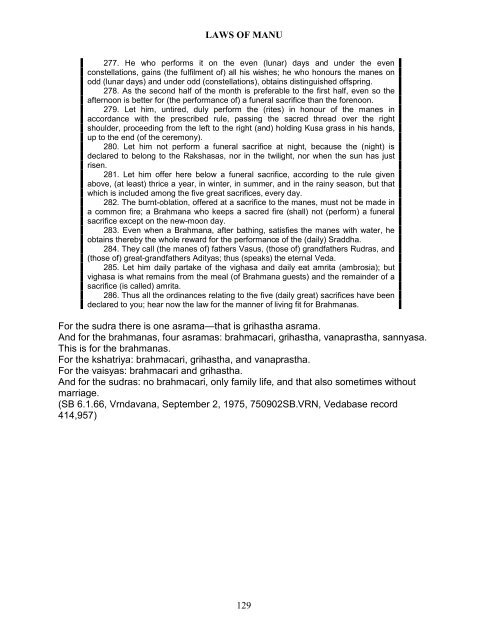Create successful ePaper yourself
Turn your PDF publications into a flip-book with our unique Google optimized e-Paper software.
LAWS OF MANU<br />
277. He who performs it on the even (lunar) days and under the even<br />
constellations, gains (the fulfilment of) all his wishes; he who honours the manes on<br />
odd (lunar days) and under odd (constellations), obtains distinguished offspring.<br />
278. As the second half of the month is preferable to the first half, even so the<br />
afternoon is better for (the performance of) a funeral sacrifice than the forenoon.<br />
279. Let him, untired, duly perform the (rites) in honour of the manes in<br />
accordance with the prescribed rule, passing the sacred thread over the right<br />
shoulder, proceeding from the left to the right (and) holding Kusa grass in his hands,<br />
up to the end (of the ceremony).<br />
280. Let him not perform a funeral sacrifice at night, because the (night) is<br />
declared to belong to the Rakshasas, nor in the twilight, nor when the sun has just<br />
risen.<br />
281. Let him offer here below a funeral sacrifice, according to the rule given<br />
above, (at least) thrice a year, in winter, in summer, and in the rainy season, but that<br />
which is included among the five great sacrifices, every day.<br />
282. The burnt-oblation, offered at a sacrifice to the manes, must not be made in<br />
a common fire; a Brahmana who keeps a sacred fire (shall) not (perform) a funeral<br />
sacrifice except on the new-moon day.<br />
283. Even when a Brahmana, after bathing, satisfies the manes with water, he<br />
obtains thereby the whole reward for the performance of the (daily) Sraddha.<br />
284. They call (the manes of) fathers Vasus, (those of) grandfathers Rudras, and<br />
(those of) great-grandfathers Adityas; thus (speaks) the eternal Veda.<br />
285. Let him daily partake of the vighasa and daily eat amrita (ambrosia); but<br />
vighasa is what remains from the meal (of Brahmana guests) and the remainder of a<br />
sacrifice (is called) amrita.<br />
286. Thus all the ordinances relating to the five (daily great) sacrifices have been<br />
declared to you; hear now the law for the manner of living fit for Brahmanas.<br />
For the sudra there is one asrama—that is grihastha asrama.<br />
And for the brahmanas, four asramas: brahmacari, grihastha, vanaprastha, sannyasa.<br />
This is for the brahmanas.<br />
For the kshatriya: brahmacari, grihastha, and vanaprastha.<br />
For the vaisyas: brahmacari and grihastha.<br />
And for the sudras: no brahmacari, only family life, and that also sometimes without<br />
marriage.<br />
(SB 6.1.66, Vrndavana, September 2, 1975, 750902SB.VRN, Vedabase record<br />
414,957)<br />
129


















